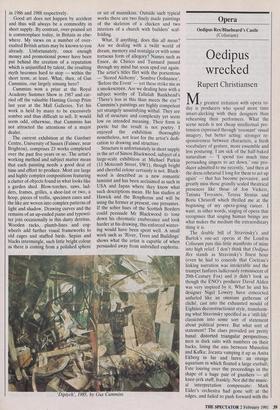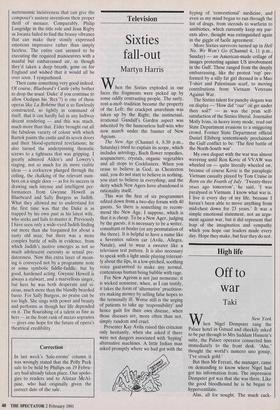Opera
Oedipus Rex/Bluebeard's Castle (Coliseum)
Oedipus wrecked
Rupert Christiansen
My greatest irritation with opera to- day is producers who spend more time smart-alecking with their designers than rehearsing their performers. What the scene needs is not cheap intellectual pre- tension expressed through 'resonant' visual imagery, but better acting: stronger re- sponsiveness between characters, a fresh vocabulary of gesture, more ensemble and less posturing. I am sick of the half-baked naturalism — 'I spend too much time persuading singers to act down,' one pro- ducer admitted to me recently, 'and then at the dress rehearsal I long for them to act up again' — that has become pervasive, and greatly miss those grandly scaled theatrical presences like those of Jon Vickers, Tatiana Troyanos, Teresa Stratas and Boris Christoff which thrilled me at the beginning of my opera-going career. I want, in other words, staging of opera that recognises that singing human beings are what makes the medium the extraordinary thing it is.
The double bill of Stravinsky's and Bartok's one-act operas at the London Coliseum puts this little manifesto of mine into high relief. I don't think that Oedipus Rex stands as Stravinsky's finest hour (even he had to concede that Cocteau's linking narration was intolerable and the trumpet fanfares ludicrously reminiscent of 20th-Century Fox) and it didn't look as though the ENO's producer David Alden was very inspired by it. What he and his designer Nigel Lowery have concocted unfurled like an omnium gatherum of cliché, cast into the exhausted mould of Eighties deconstructionist style, transform- ing what Stravinsky specified as a 'still-life' classicism into some sort of statement about political power. But what sort of statement? The clues provided are pretty banal: distorted triangular perspectives; men in dark suits with numbers on their backs, lining the axis between Mussolini and Kafka; Jocasta vamping it up as Anita Ekberg in fur and lurex: an orange aquarium in which floated a large eyeball; Fate louring over the proceedings in the shape of a huge pair of gnashers — all knee-jerk stuff, frankly. Nor did the music- al interpretation compensate: Mark Elder's orchestra had gone soft at the edges, and failed to push forward with the
metronomic incisiveness that can give the composer's austere inventions their proper thrill of menace. Comparably, Philip Langridge in the title role and Jean Rigby as Jocasta failed to find the brassy vibrance that can make their stonily expressed emotions impressive rather than simply faceless. The entire cast seemed to be executing the required manoeuvres with a manful but embarrassed air, as though they'd taken a deep breath, gone on for England and wished that it would all be over soon. I sympathised.
Then came something very good indeed. Of course, Bluebeard's Castle (why bother to drop the usual 'Duke' if you continue to allow Oedipus his 'Rex"?) is one of those operas like La Boheme that is so flawlessly constructed, so tightly in command of itself, that it can hardly fail in any halfway decent rendering — and this was much, much more than that. Elder brought out all the fabulous variety of colour with which Bartok paints the castle and its seven doors and their blood-spattered revelations; he also turned the underpinning thematic screws to a tightness that was gripping. I greatly admired Alden's and Lowery's staging, not so much for its more visible ideas — a corkscrew plunged through the ceiling, the chalking of the relevant num- bers on a single door — as for its success in drawing such intense and intelligent per- formances from Gwynne Howell as Bluebeard and Sally Burgess as Judith. What they allowed me to understand for the first time was that the Duke is as trapped by his own past as his latest wife, who seeks and fails to master it. Previously I have seen only a wide-eyed Judith finding out more than she bargained for about a nasty old man; but there was a more complex battle of wills in evidence, from which Judith's motive emerges as not so much adolescent curiosity as sexual pre- datoriness. Now this extra layer of mean- ing is conveyed not by a programme note or some symbolic fiddle-f addle, but by good, hardened acting. Gwynne Howell is always a stalwart, and a marvellous singer, but here he was both desperate and vi- cious, much more than the blandly bearded basso. For Sally Burgess, no praise can be too high. She sings with power and beauty and performs as though her life depended on it. The flourishing of a talent as fine as hers — in the front rank of mezzo sopranos — gives one hope for the future of opera's theatrical credibility.



















































 Previous page
Previous page